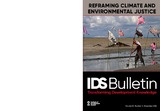Reframing Climate and Environmental Justice
| dc.contributor.author | Huff, Amber | |
| dc.contributor.author | Naess, Lars Otto | |
| dc.date.accessioned | 2022-12-05T17:08:05Z | |
| dc.date.available | 2022-12-05T17:08:05Z | |
| dc.date.issued | 2022-12-12 | |
| dc.identifier.citation | Huff, A. and Naess, L.O. (2022) 'Reframing Climate and Environmental Justice', IDS Bulletin 53.4, DOI: 10.19088/1968-2022.133 | en |
| dc.identifier.issn | 1759-5436 | |
| dc.identifier.uri | https://opendocs.ids.ac.uk/opendocs/handle/20.500.12413/17778 | |
| dc.description.abstract | Despite a growing focus on the justice dimensions of climate and environmental change, this issue of the IDS Bulletin argues that there are still ‘blind spots’ in dominant mainstream approaches to climate and environmental justice. These approaches share a tendency to place growth, not ecology, nor climate, and certainly not justice, at the heart of the international policy agenda. The articles in this issue bring together a range of empirically grounded studies that add to – and challenge – some of the dominant views and approaches, and unearth some key ‘hidden’ aspects of the justice dimensions of climate and environmental change. In particular, this IDS Bulletin highlights three major ‘blind spots’ in climate and environmental justice debates: a persistent failure to recognise diverse contexts and knowledges; continuing failure to sufficiently appreciate the deep-seated contestations around climate and environmental justice; and the risks associated with ‘recovery’ and ‘emergency’ mindsets driving climate and environmental policy agendas. The articles offer principles to address those ‘blind spots’ in order to move towards more just and inclusive pathways for climate and environmental policy processes. In doing so, the articles recognise that there will be variation – across sites and social groups – in the needs, aspirations, and meaningful notions of justice for those who experience the greatest vulnerabilities in the face of change. True solutions may require that powerful political and economic actors’ interests are challenged or that dominant forms of ‘expertise’ are questioned. Approaches to climate and environmental justice must reject efforts to apply one-size-fits-all solutionism. | en |
| dc.description.sponsorship | IDS Strategic Research Initiative on Climate and Environmental Justice | en |
| dc.language.iso | en | en |
| dc.publisher | Institute of Development Studies | en |
| dc.relation.ispartofseries | IDS Bulletin;53.4 | |
| dc.rights | This is an Open Access journal distributed under the terms of the Creative Commons Attribution Non Commercial 4.0 International licence (CC BY-NC), which permits use, distribution and reproduction in any medium, provided the original authors and source are credited, any modifications or adaptations are indicated, and the work is not used for commercial purposes. http://creativecommons.org/licenses/by-nc/4.0/legalcode | en |
| dc.rights.uri | http://creativecommons.org/licenses/by-nc/4.0/ | en |
| dc.subject | Climate Change | en |
| dc.subject | Environment | en |
| dc.title | Reframing Climate and Environmental Justice | en |
| dc.type | Article | en |
| dc.rights.holder | Institute of Development Studies | en |
| dc.identifier.team | Resource Politics | en |
| dc.identifier.doi | 10.19088/1968-2022.133 | |
| dcterms.dateAccepted | 2022-12-12 | |
| rioxxterms.funder | Default funder | en |
| rioxxterms.version | VoR | en |
| rioxxterms.versionofrecord | 10.19088/1968-2022.133 | en |
Files in this item
This item appears in the following Collection(s)
Except where otherwise noted, this item's license is described as This is an Open Access journal distributed under the terms of the Creative Commons Attribution Non Commercial 4.0 International licence (CC BY-NC), which permits use, distribution and reproduction in any medium, provided the original authors and source are credited, any modifications or adaptations are indicated, and the work is not used for commercial purposes. http://creativecommons.org/licenses/by-nc/4.0/legalcode


